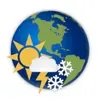Weather radio Live Radio Stations
Radio Stations
- NOAA Weather Nashville TN, KIG79

- NOAA Weather Radio - KHB36 - Manassas, VA - 162.550 MHzNOAA Weather Radio - KHB36 - Manassas, VA - 162.55...
- NOAA Weather Radio - WNG736 - District of Columbia - 162.450MHzNOAA Weather Radio - WNG736 - District of Columbia...
- NOAA Weather Radio (Twin Cities, MN)

- WZ2523 - NOAA Weather RadioWZ2523 - NOAA Weather Radio
Choose a Genre
The Importance of Weather Radio Stations in Severe Weather Preparedness
Weather radio stations are an essential source of up-to-the-minute weather information, offering vital emergency alerts and forecasts for those living in areas prone to severe weather conditions. Typically operated by the National Oceanic and Atmospheric Administration (NOAA), these stations specialize in broadcasting 24/7 updates on current weather conditions, severe weather warnings, and other emergency alerts, ensuring that listeners are well-informed when disaster strikes.
Weather radio stations are usually available on the FM band and, more notably, through NOAA Weather Radio, a nationwide network of stations that operate on seven VHF frequencies. This broad coverage means that listeners across the United States can access critical weather information no matter where they are, providing peace of mind during potentially dangerous weather events. NOAA Weather Radio stations are equipped with special receivers capable of alerting people to immediate dangers, such as tornadoes, hurricanes, flash floods, and other extreme weather phenomena.
One of the standout features of weather radio stations is their reliability. Unlike traditional media outlets that depend on internet or cellular services, weather radio stations provide a direct, independent source of information. This feature is particularly important when severe weather disrupts power or communication networks. In areas where infrastructure might fail, weather radios remain functional, offering consistent updates even in the midst of a storm.
Beyond weather alerts, weather radio stations also provide listeners with the latest forecasts, current conditions, and radar images. These stations often broadcast interviews with meteorologists and emergency management officials, offering expert analysis on what to expect from upcoming weather events. They also provide weather-related news stories that help the public understand broader patterns, such as seasonal shifts or long-term climate changes.
Weather radio stations are invaluable to those living in regions that experience frequent severe weather. For example, people in "Tornado Alley" or coastal areas vulnerable to hurricanes rely on these broadcasts to prepare for, and react to, severe weather situations. The stations are also beneficial for outdoor enthusiasts, such as hikers, campers, and boaters, as they offer real-time weather updates that can impact their plans and safety during outdoor activities.
In conclusion, weather radio stations are a critical tool for ensuring public safety and preparedness. By providing reliable, real-time weather information and emergency alerts, they help listeners make informed decisions and take action to protect themselves, their families, and their property in the face of severe weather conditions. Whether at home, work, or on the go, weather radio stations play a vital role in keeping the public safe during times of crisis.
Weather radio stations are an essential source of up-to-the-minute weather information, offering vital emergency alerts and forecasts for those living in areas prone to severe weather conditions. Typically operated by the National Oceanic and Atmospheric Administration (NOAA), these stations specialize in broadcasting 24/7 updates on current weather conditions, severe weather warnings, and other emergency alerts, ensuring that listeners are well-informed when disaster strikes.
Weather radio stations are usually available on the FM band and, more notably, through NOAA Weather Radio, a nationwide network of stations that operate on seven VHF frequencies. This broad coverage means that listeners across the United States can access critical weather information no matter where they are, providing peace of mind during potentially dangerous weather events. NOAA Weather Radio stations are equipped with special receivers capable of alerting people to immediate dangers, such as tornadoes, hurricanes, flash floods, and other extreme weather phenomena.
One of the standout features of weather radio stations is their reliability. Unlike traditional media outlets that depend on internet or cellular services, weather radio stations provide a direct, independent source of information. This feature is particularly important when severe weather disrupts power or communication networks. In areas where infrastructure might fail, weather radios remain functional, offering consistent updates even in the midst of a storm.
Beyond weather alerts, weather radio stations also provide listeners with the latest forecasts, current conditions, and radar images. These stations often broadcast interviews with meteorologists and emergency management officials, offering expert analysis on what to expect from upcoming weather events. They also provide weather-related news stories that help the public understand broader patterns, such as seasonal shifts or long-term climate changes.
Weather radio stations are invaluable to those living in regions that experience frequent severe weather. For example, people in "Tornado Alley" or coastal areas vulnerable to hurricanes rely on these broadcasts to prepare for, and react to, severe weather situations. The stations are also beneficial for outdoor enthusiasts, such as hikers, campers, and boaters, as they offer real-time weather updates that can impact their plans and safety during outdoor activities.
In conclusion, weather radio stations are a critical tool for ensuring public safety and preparedness. By providing reliable, real-time weather information and emergency alerts, they help listeners make informed decisions and take action to protect themselves, their families, and their property in the face of severe weather conditions. Whether at home, work, or on the go, weather radio stations play a vital role in keeping the public safe during times of crisis.